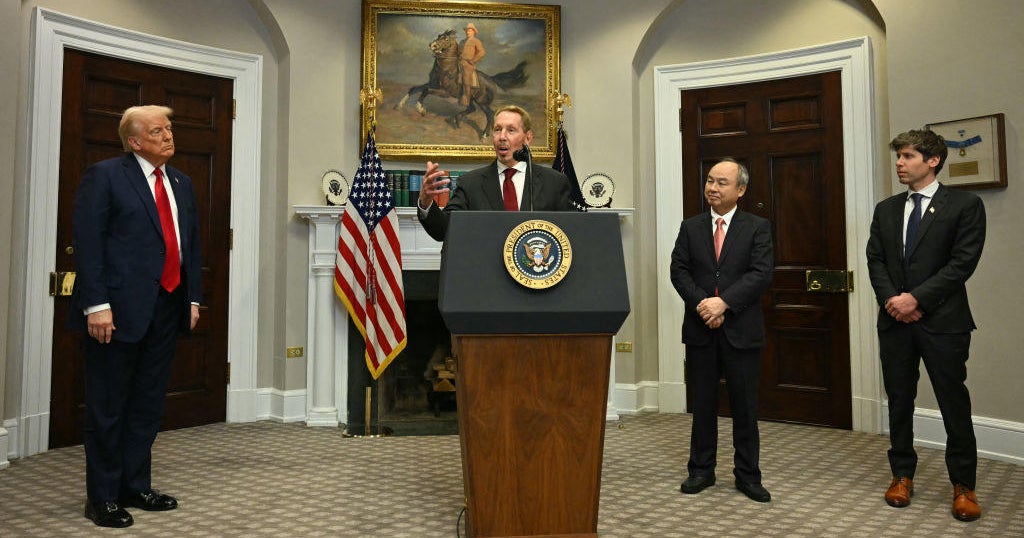U.S. admits 100,000 Ukrainians in 5 months, fulfilling Biden pledge
The U.S. received more than 100,000 Ukrainians in roughly five months following Russia's invasion of Ukraine, fulfilling President Biden's pledge of providing a temporary safe haven to those displaced as part of the largest refugee exodus since World War II, government statistics obtained by CBS News show.
The tens of thousands of Ukrainians who have set foot on U.S. soil since the February 24 invasion have arrived through various immigration channels and with different legal status, most of them with temporary permission to stay in the country, according to the government data.
Approximately 47,000 Ukrainians have come to the U.S. on temporary or immigrant visas; nearly 30,000 Ukrainians arrived under a private sponsorship program; more than 22,000 Ukrainians were admitted along the U.S.-Mexico border; and 500 Ukrainians entered the country through the traditional refugee system, the data show.
As part of his aggressive stance against Russia's ongoing invasion of Ukraine, Mr. Biden in late March promised to welcome 100,000 Ukrainians displaced by the war — a small fraction of the millions of Ukrainians who have fled to other parts of Europe. The White House said at the time that Ukrainians would come to the U.S. through different immigration programs.
The U.S. Department of Homeland Security (DHS) confirmed the over 100,000 Ukrainian arrivals, saying the objective "was never a cap."
"We are deeply proud to help provide refuge for Ukrainians fleeing Russia's unprovoked invasion," Homeland Security Secretary Alejandro Mayorkas said in a statement to CBS News. "DHS will continue to welcome additional Ukrainians in the weeks and months to come, consistent with President Biden's commitment."
Only Ukrainians who entered the U.S. with immigrant visas or through the refugee admissions program have a direct path to permanent residency and ultimately, U.S. citizenship. These immigration pathways, however, typically take years to complete due to interviews, vetting and other steps.
Those who have arrived through the Uniting for Ukraine program, which was launched in late April to allow U.S.-based individuals to financially sponsor Ukrainians, were granted parole, a temporary humanitarian immigration classification that allows them to live and work in the U.S. for two years.
Ukrainians who were processed at ports of entry along the U.S. southern border after flying to Mexico, an unprecedented flow that peaked in April before being largely shut down, were exempted from the Title 42 pandemic-era restrictions on humanitarian grounds and also granted parole on a temporary basis.
Ukrainians who arrived on temporary visas, such as those for tourists and business travelers, similarly don't have a clear pathway to obtain permanent U.S. legal status.
However, Ukrainians on U.S. soil can seek asylum, which, if granted, would allow them to become permanent residents. Ukrainians who arrived in the U.S. before April 19 are also eligible for Temporary Protected Status (TPS), another humanitarian program that allows beneficiaries to work and live in the U.S. legally.
To fulfill Mr. Biden's pledge, DHS in late April set up the Uniting for Ukraine program, a free initiative that has drawn tens of thousands of applications from U.S. citizens and others hoping to sponsor the resettlement of Ukrainians, including their family members.
Since April 25, U.S. Citizenship and Immigration Services (USCIS) has received 92,000 applications from U.S. individuals seeking to sponsor Ukrainians, DHS figures show. More than 62,000 Ukrainians have been granted permission to travel to the U.S. as of July 29, including the nearly 30,000 individuals who have arrived so far, according to the DHS data.
While the U.S. was able to achieve Mr. Biden's objective in a relatively short time period, the 100,000 Ukrainian arrivals in the U.S. pale in comparison to the number of Ukrainians that European countries have received.
European countries are hosting more than 6 million Ukrainian refugees, the bulk of whom are in Russia, Poland, Germany, the Czech Republic, Italy, Turkey, Spain and the United Kingdom, according to the United Nations refugee agency.
While Biden administration officials have said most Ukrainians are seeking temporary refuge from the Russian invasion — not permanent resettlement — immigration experts expect that many Ukrainians will decide to stay in the U.S., especially if the war in their homeland rages on.
Those Ukrainians could find themselves in legal limbo unless Congress legalizes them or they apply for and win asylum. But Congress has failed to pass legalization programs in recent years amid intense partisan fighting over immigration, and the U.S. asylum system is massively backlogged with nearly 500,000 pending cases.
The Biden administration has also faced criticism from progressives and refugee advocates for prioritizing displaced Ukrainians while other migrant populations, including at-risk Afghans who were not resettled last summer and some asylum-seekers who face expulsion at the U.S.-Mexico border, remain in limbo.
Krish O'Mara Vignarajah, president of the Lutheran Immigration and Refugee Service, one of nine national U.S. resettlement groups, applauded the administration's extensive effort to offer a safe haven to Ukrainians, but she said it illustrates that some immigrants are "benefiting from urgent action more than others."
"The effort is a classic example of where there's a will, there's a way," Vignarajah said, citing policies preventing Latin American migrants and Afghan refugees from coming to the U.S. "We need to recognize that there is inequity in our immigration system."






